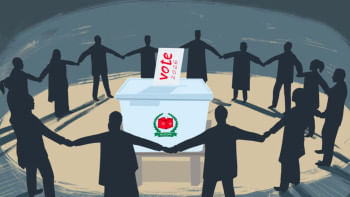REPLANTING THE BONSAI: Empowering Bangladeshi diaspora for a changing Gulf

In the heart of Doha, a city where modernity meets tradition, the Earthna Summit 2025 was convened on April 23, in the iconic Msheireb Downtown—a district that has become a global model for fusing energy-efficient design with Qatari heritage. The event was not just a gathering of experts and policymakers. It was a moment of reflection for the Bangladeshi expatriate community, many of whom have carved out lives in the Gulf with both ambition and trepidation. As the world's leaders and innovators gathered to discuss climate change and sustainable development, the eyes of Qatar's Bangladeshi diaspora members were on a singular figure whose voice has long echoed their hopes: Chief Adviser to the Bangladesh interim government Prof Muhammad Yunus.
Chief Adviser Yunus' keynote address urged an end to the systemic barriers that restrict the potential of young people. He reminded the audience that limitations on growth often stem not from an individual's inherent capabilities, but from the structures that confine them. "A bonsai tree is not small because of its seed," he said. "It is small because of the pot it is placed in." His call to rethink these boundaries resonated across the room, but it was particularly poignant for those in attendance who have lived with the constraints of a system that too often limits opportunity.
While the 2022 FIFA World Cup brought a wave of opportunity and infrastructure development to Qatar, many Bangladeshi workers now find themselves navigating an economy that is increasingly prioritising high-skilled service industries. For those who arrived with expertise in construction and manual labour, pathways to career mobility remain limited. The transition towards a more knowledge- and service-based economy has not been matched with inclusive upskilling or retraining efforts, leaving many migrant workers in uncertain and precarious employment conditions.
To grasp the layered and often invisible struggles shaping the lives of Bangladeshi migrant workers in Qatar, I sat down with Amin Rasul, secretary of the Bangladesh Community Qatar (BCQ) and a senior engineer at Qatar Electricity and Water Company. Rasul, who has worked closely with Qatar's Ministry of Labor and international organisations such as the International Labour Organization (ILO), provided valuable insights into the complexities of the situation.
"The issue of managing such a large workforce is a multifaceted one," Rasul explained. "But at its core, it stems from the way recruitment operates. Many workers fall prey to unethical recruitment practices, where agents promise jobs and charge exorbitant fees. Once they arrive in Qatar, they often find themselves either jobless, in unsuitable roles, or trapped in conditions where employers control their bank cards and access to wages. Legally, systems may appear compliant, but exploitation continues through informal practices."
While recent reforms in Qatar, such as the 90-day grace period allowing workers to seek new employment after termination, have shown a commitment to improving labour conditions, the challenge remains one of awareness. "There is a hotline," Rasul noted, "but most workers are unaware of its existence. They are often victims of exploitation before they even have the opportunity to act."
Beyond legal reforms, there is also a pressing need for better access to education and skills development for the migrant workforce. Many Bangladeshi workers, even those in skilled professions such as engineering or healthcare, arrive in the Gulf with limited proficiency in the region's languages—Arabic and English. The result is a mismatch between the skills of the workers and the demands of the labour market. Opportunities in service sectors like hospitality remain limited for Bangladeshis, especially compared to other Asian diaspora communities such as the Indian, Pakistani, Nepali, and Filipino populations who are more integrated due to stronger language and communication competencies, said Zillur Rahman Biswas, a Bangladeshi educationist examining diaspora education in the Gulf. The reasons why other nations' diaspora schools have more institutional backing stems from many factors, including "larger and more affluent expatriate populations with longer establishments in the Gulf and a robust investor base," said Biswas.
"There is overwhelming demand for quality education among Bangladeshi families in Qatar," he shared. "We lack the space, trained staff, and institutional backing that schools of the Indian or Pakistani communities enjoy. This has long-term implications—not just for educational equity, but for the ability of our youth to compete in a global labour market."
During a visit to Qatar's Bangladeshi diaspora schools, which now serves around 1,800 students, I spoke with educators who highlighted the challenges they face. Overwhelmed by demand, the school had to introduce a second shift to accommodate the increasing number of students. Tuition fees remain low, ranging from QAR 350 to QAR 550 per month depending on grade level. Yet, despite the affordability, the school struggles with limited facilities, teacher training and resources. In stark contrast, other Asian diaspora communities have schools with greater investment, better infrastructure, and broader institutional recognition.
Bangladeshi community representatives consistently express the need for better schooling options that are both affordable and internationally aligned, to ensure that students are prepared for a changing and competitive job market.
Qatar is one of the top 10 remittance source countries for Bangladesh. According to remittance landscape and trajectory, remittance from Qatar amounted to $1.5 billion in FY2024. The scope for expanding the remittance portfolio in Qatar remains high, but the issue of skills development for Bangladesh's migrant workers continues to pose barriers. But this issue goes beyond the immediate needs of those living in the Gulf—it is tied directly to Bangladesh's larger aspirations on the global stage. As Bangladesh seeks to position itself as a manufacturing powerhouse—what some are calling the "factory of the world"—the need for a workforce that is both skilled and adaptable is more urgent than ever. Without a strategic investment in education, training, and language acquisition, Bangladesh risks falling behind in an increasingly competitive global market.
Dr Yunus' visit to Doha also marked a significant step forward in Qatar-Bangladesh relations. During his discussions with the Qatari government, issues such as workforce planning and the repayment of accumulated gas bills were on the table. These high-level engagements demonstrate a mutual commitment to strengthening bilateral ties, not just in economic terms but in ways that respect and invest in the people who form the backbone of both nations' growth.
Ultimately, the success of Bangladesh's diaspora depends on empowering its youth to not merely survive but to excel. The world of work is rapidly evolving, and the opportunities available to young Bangladeshis in the Gulf, or anywhere else, will be shaped by how well they are prepared to engage with a dynamic, complex global economy.
Sarzah Yeasmin is a policy analyst working on the intersections of education and development economics. She is an alumna of Harvard University.
Views expressed in this article are the authors' own.
Follow The Daily Star Opinion on Facebook for the latest opinions, commentaries and analyses by experts and professionals. To contribute your article or letter to The Daily Star Opinion, see our guidelines for submission.

 For all latest news, follow The Daily Star's Google News channel.
For all latest news, follow The Daily Star's Google News channel. 








Comments